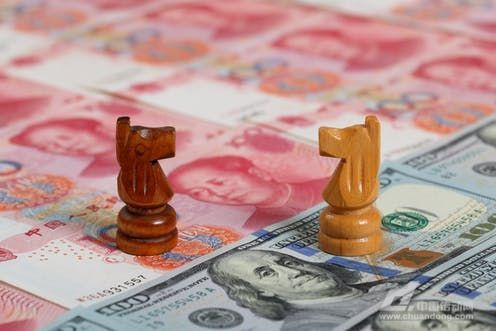On April 18, according to foreign media reports, China and the United States are engaged in an increasingly fierce and fierce battle. Both sides threaten to impose heavy taxes on each other’s imports, and the technology industry may become the biggest victim.

So far, most of the information and communication technologies have not been affected. However, tensions have gradually emerged in the field of science and technology. The United States has just banned US companies from selling products to ZTE, the Chinese mobile phone maker, and hinted that further protectionist measures will be taken to divest the key chip customers of US chip giant Qualcomm.
There is a close connection between the science and technology industries in China and the United States. Like the semiconductor industry, they are also vulnerable to an additional round of proposed tariffs. Analysts said that from a broader perspective of the technology industry, it is difficult to distinguish between the threats faced by the semiconductor industry, including the "brains" and processing capabilities of smartphones and car consoles.
John Pitzer, an analyst with Credit Suisse, wrote earlier this month: “We received a lot of customer requests and we hope to give us an opinion on the semiconductor industry because this is an escalation between China and the United States. Trade tensions are related. It is hard enough to predict all possible moves on a single board, but now it feels more like a 3D board."
Analysts said that if the Sino-U.S. trade tensions escalate, the technology industry may suffer more damage.
Stock market fluctuations
If investors try to hedge the risk of Sino-US trade wars, tech stocks may not be able to provide safe havens for traders to think, because many stocks are already high and this year has hit a record high.
J.P. Morgan analysts said they are "cautious" about the development of the technology industry because they have well-designed supply chains and are very sensitive to consumer and business confidence, and trade warfare is not good for them. The impact may be substantial.
They added that soaring tech stocks have "such dramatic fluctuations." This means that investors may profit and transfer funds to safer bets that have room for growth.
Analysts wrote in the research report: “In view of the outstanding performance and over-valuation over the years, we believe investors should lock in the profits of the technology industry.â€
Poolfish
Credit Suisse analyst Pitzet wrote that if the industry using chips (such as transportation, machinery, or even security cameras) is affected by higher tax rates, the technology industry may face greater pressure.
Dan Harris, author of "China Law Blog," pointed out that the subject of "fishing fish" is not only related to the tax department. Any American brand related to China's trade tensions may also be affected by marketing activities. For example, companies with physical stores such as retail and restaurants are most likely to suffer from anti-American sentiment.
However, many U.S. technology companies, especially Apple, have also received large amounts of revenue from China.
Other initiatives
Harris said that in addition to raising tariffs, China may adopt more stringent legal measures, which will cause even greater blows to US companies. In the past year, China has increasingly tracked and expelled foreign companies, especially American companies, because these companies do not have legal documents in China.
GBInsights analyst Dan Ives said that China can also allow US technology companies to stay in China, but the cost of maintaining a store in China is much higher, and the difficulty is much greater.
U.S. technology giants like Apple and Intel are most vulnerable to rising infrastructure costs or red tape, because a large part of their supply chain is operating in China and employees are Chinese workers.
Ives said that although China and the United States are very fierce in their rhetoric, it is unlikely that China will "put a rock on its feet" in this way.
B2B tariff
Ives believes that so far, tariff proposals have had the greatest impact on consumer products, but the new round of proposed tariffs may increase risks including business-to-business (B2B) sales.
RaymondJames analyst ChrisCaso said that China leads the world in semiconductor consumption, accounting for 40% to 50% of global demand. Giants like Alibaba, Baidu and Huawei are all counting on US chip makers to provide chips. If China decides to adopt the same semiconductor product taxation plan as the U.S. government, U.S. companies may lose key customers.
Gasol added: “In addition to Apple, few US technology companies (including Google, Facebook, and Microsoft) have succeeded in sales in China. In my opinion, the next phase of upgrades may affect the field of intellectual property, and more B2B field."
Protection of intellectual property
A number of analysts said that the second round of proposed tariffs on Chinese goods may take more measures to protect US intellectual property rights. Puece wrote: “Although the focus today is on trade, the real agenda is to protect the intellectual property of the United States. The relationship between the two sides in intellectual property will become increasingly tense.â€
In March this year, the White House spokesperson announced its intention to make a clear response to “the Chinese government-led efforts to distort market forces and pressure and efforts to steal American technology and intellectual property.†However, Ives said that the first round of proposed tariffs has not yet achieved this goal, suggesting that technology companies face potential risks.
John Vinh, equity research analyst at KeyBanc Capital Markets, said that future US legislation restricting the sharing of information with China may have a greater impact on the US technology sector. This may limit the expansion of 5G network connectivity, which is currently dominated by US companies such as Qualcomm and Texas Instruments.
Weh also said that cloud computing and machine learning are also easily regulated, even if they are facing increasingly fierce competition from Alibaba, Baidu, Tencent, and Huawei. The Wall Street Journal reported that cloud computing may be the target of trade regulators.
RaymondJames analyst Gasol wrote: “At least the United States may limit semiconductor sales for key technologies such as 5G or artificial intelligence, and Chinese manufacturers such as Huawei and ZTE will undoubtedly want to participate in it. If it does not have far-reaching collateral damage, it will not These restrictions may be implemented, but if export restrictions are imposed on the chips used in many other areas of the product, this may have a far-reaching and far-reaching impact."
ZGAR Vape Pods 6.0S
ZGAR electronic cigarette uses high-tech R&D, food grade disposable pod device and high-quality raw material. All package designs are Original IP. Our designer team is from Hong Kong. We have very high requirements for product quality, flavors taste and packaging design. The E-liquid is imported, materials are food grade, and assembly plant is medical-grade dust-free workshops.
From production to packaging, the whole system of tracking, efficient and orderly process, achieving daily efficient output. WEIKA pays attention to the details of each process control. The first class dust-free production workshop has passed the GMP food and drug production standard certification, ensuring quality and safety. We choose the products with a traceability system, which can not only effectively track and trace all kinds of data, but also ensure good product quality.
We offer best price, high quality Pods, Pods Touch Screen, Empty Pod System, Pod Vape, Disposable Pod device, E-cigar, Vape Pods to all over the world.
Much Better Vaping Experience!

ZGAR Vape 6.0 Pods,ZGAR Vape Pods 6.0S,ZGAR Vape Pods 6.0S Pod System Vape,ZGAR Vape Pods 6.0S Disposable Pod Vape Systems
ZGAR INTERNATIONAL(HK)CO., LIMITED , https://www.zgarpods.com